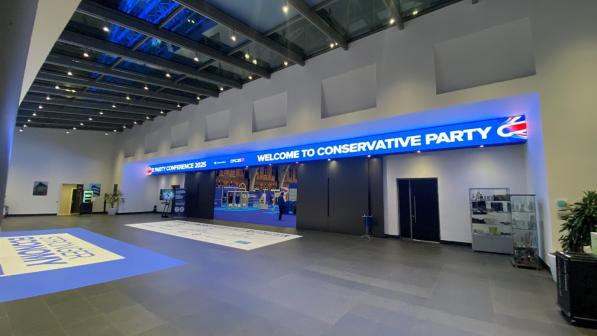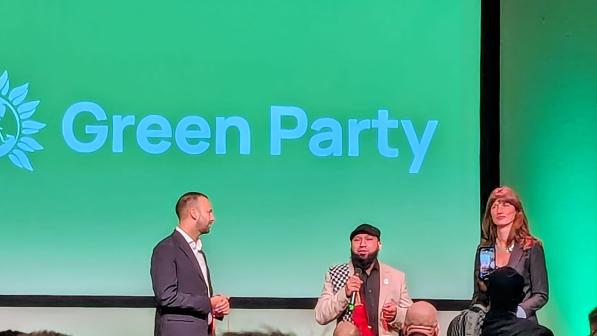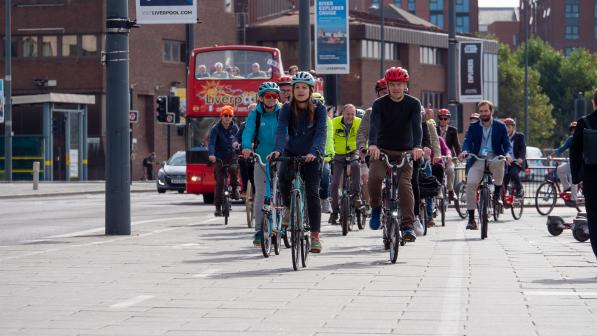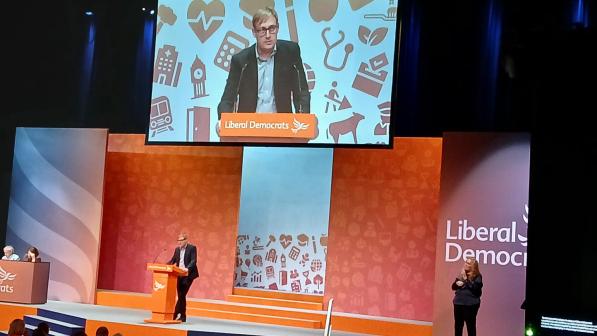SNP conference 2025: gearing up for election year in Scotland

It’s been conference season across the UK and while my colleagues have been doing the rounds down south, in mid-October (11-13th) I travelled up to Aberdeen for the SNP Party conference.
When we attended the SNP conference last year, we enjoyed some beautiful autumn sunshine while showing off electric bikes to ministers. This year, however, it was the party that was in a sunnier mood compared to last conference.
It seems last year’s general election results have been parked, and the focus is now on the job ahead: gearing up for an election in Scotland.
This conference was a chance for the SNP to lay out their vision for Scotland ahead of the Scottish Parliament election on 7 May 2026.
Polls are a snapshot in time and can change quickly, but current polling suggests that the SNP will win the most seats, and probably enough to lead a minority government. With many longstanding ministers standing down, there will be lots of new faces in next parliament, whatever the result.
Fight for better transport
This years’ conference being in Aberdeen felt like a reflection of the party’s desire to engage the energy sector. Unfortunately, transport didn’t feature highly on the agenda while I was there.
It did feel emblematic that the shuttle buses to the venue didn’t correspond to the arriving trains. And as I couldn’t book my bike onto my train, I ended up sharing a cramped taxi to conference.
The consequences for me were far less serious than someone living in transport poverty, but the dilemma was similar. (Something I wrote about recently in a guest blog in support of Poverty Alliance’s ‘Challenge Poverty Week’.)
Addressing transport poverty and other societal challenges takes investment and progressive policies, including in public transport and active forms of travel.
In John Swinney’s speech to conference he talked up what he sees as the benefits of self-government in Scotland, including the work of his government to make bus transport free to under 22s and removing peak fares on the trains.
The current government is highly unlikely to meet its own commitment to spend at least 10% of the transport budget on active travel by the end of this parliament; it’s currently about 6% this year. We have seen, however, an 80% increase in funding for cycling, walking and wheeling over the past five years.
There have been genuinely life-changing improvements to towns and cities across Scotland as a result of investment in cycling during this parliament.
Whichever party ends up forming the next government should heed this example: cycling is popular and effective, and we’ll be working to make sure all parties realise this when developing their own manifestos.
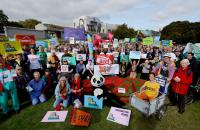
We’ve provided each party in Scotland with our provisional manifesto (you can read a preview here).
Coalition working a likelihood
Holyrood was designed to make majority governments unlikely, and should the SNP be unable to secure a majority they may look to govern in coalition – which shows the importance of broad political support for issues such as cycling.
It’s easy to think of cycling as solely a transport issue but we know that it is a potential solution for many of the issues that people face today. Cycling can ease congestion in towns and cities, improve mental and physical health, improve public health and save the NHS money, help people save themselves money and potentially escape transport poverty.
This is why cross-sectoral support is so important. We’ve signed up to SORA, SCCS and the Joint active travel manifestos which also make calls for continued investment in active travel.
Cycling is a non-partisan issue which benefits people across Scotland. For example, our ‘My Ride. Our right’ campaign has had good political engagement from parties across Holyrood. We organised glow rides in Scotland and across the UK to demonstrate the depth of support there is for better cycling infrastructure – especially from women.
Cycling UK in coalition
Through our own coalition working we helped Stop Climate Chaos Scotland organise the Scotland’s largest mass lobby in Holyrood last month. We managed to attract 27 MSPs (1 in 5 MSPs). The First Minister, John Swinney MSP, also made an appearance which shows there is an appetite in Scotland for policies which benefit people and planet.
We’ve also recently met and had a productive conversation with Reform’s first representative in the Scottish Parliament, Graham Simpson MSP. We’ll be meeting with Scottish Labour soon and hope to get meetings with the Scottish Liberal Democrats and Scottish Conservatives in due course.
This weekend (18-19 October) I headed to the first Scottish Green Party conference under the leadership of Gillian Mackay and Ross Greer, and their busiest for 10 years. Leaders and ex-leaders of the Greens were at the SCCS mass lobby and have tended to support policies which favour active travel.
Lorna Slater MSP opened the conference by making clear how much her party valued cycling. The party also passed resolutions which showed their intent with regards to transport – vowing to bring the buses in Scotland back into public ownership.
I was especially interested to hear whether the Greens would entertain a renewed coalition with the SNP, after the Bute House agreement dramatically ended and saw them leave government.
Perhaps unsurprisingly, it didn’t come up. However the party did reject opening talks with Jeremy Corbyn’s Your Party which seemed to be a sign that the party is also now firmly in election mode.
Finally, I’m looking forward to our roundtable discussion event in Holyrood on 4 November ‘Riding together for better health’, hosted by Stuart MacMillan MSP. We’re going to be joined by experts in active travel and public health as well as representatives from all parties.
It should be an amazing opportunity to put forward our vision for cycling in Scotland as parties begin their election campaigns.
